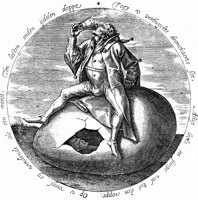Difference between revisions of "Fool"
(Created page with 'File:lighterstill.jpgright|frame ==Origin== [http://nordan.daynal.org/wiki/index.php?title=English#ca._1100-1500_.09THE_MIDDLE_ENGLISH_PERIOD Middle ...') |
m (Text replacement - "http://" to "https://") |
||
| (One intermediate revision by the same user not shown) | |||
| Line 2: | Line 2: | ||
==Origin== | ==Origin== | ||
| − | [ | + | [https://nordan.daynal.org/wiki/index.php?title=English#ca._1100-1500_.09THE_MIDDLE_ENGLISH_PERIOD Middle English], from Anglo-French fol, from Late Latin follis, from [[Latin]], bellows, bag; akin to Old High German bolla blister, balg bag |
| − | *[ | + | *[https://en.wikipedia.org/wiki/13th_century 13th Century] |
==Definitions== | ==Definitions== | ||
*1: a [[person]] lacking in [[judgment]] or [[prudence]] | *1: a [[person]] lacking in [[judgment]] or [[prudence]] | ||
| Line 12: | Line 12: | ||
4: a cold dessert of pureed fruit mixed with whipped cream or custard | 4: a cold dessert of pureed fruit mixed with whipped cream or custard | ||
==Description== | ==Description== | ||
| − | '''Foolishness''' is the lack of [[wisdom]]. In this sense it differs from [ | + | '''Foolishness''' is the lack of [[wisdom]]. In this sense it differs from [https://en.wikipedia.org/wiki/Stupidity stupidity], which is the lack of [[intelligence]]. An [[act]] of foolishness is sometimes referred to as a [[folly]]. |
| − | Foolishness and [[wisdom]] are contrasted in [[Paul, the Apostle|Paul]]'s [ | + | Foolishness and [[wisdom]] are contrasted in [[Paul, the Apostle|Paul]]'s [https://nordan.daynal.org/wiki/index.php?title=1st_Letter_of_Paul_to_the_Corinthians#1st_Letter_of_Paul_to_the_Corinthians.2C_I letter to the Corinthians]. He condemns [[intellectual]] arrogance and [[advocates]] a [[humble]] [[attitude]] of foolishness in which it is then possible to [[learn]]. [https://en.wikipedia.org/wiki/Plato Plato] likewise said, "He is the wisest man who knows himself to be ill-equipped for the [[study]] of [[wisdom]]" but [[Paul, the Apostle|Paul]] makes a distinction between [[wisdom]] and the [[reason]] of the [[Greeks]]. |
[[Category: General Reference]] | [[Category: General Reference]] | ||
Latest revision as of 00:34, 13 December 2020
Origin
Middle English, from Anglo-French fol, from Late Latin follis, from Latin, bellows, bag; akin to Old High German bolla blister, balg bag
Definitions
- 1: a person lacking in judgment or prudence
- 2a : a retainer formerly kept in great households to provide casual entertainment and commonly dressed in motley with cap, bells, and bauble
- b : one who is victimized or made to appear foolish : dupe
- 3a : a harmlessly deranged person or one lacking in common powers of understanding
- b : one with a marked propensity or fondness for something <a dancing fool> <a fool for candy>
4: a cold dessert of pureed fruit mixed with whipped cream or custard
Description
Foolishness is the lack of wisdom. In this sense it differs from stupidity, which is the lack of intelligence. An act of foolishness is sometimes referred to as a folly.
Foolishness and wisdom are contrasted in Paul's letter to the Corinthians. He condemns intellectual arrogance and advocates a humble attitude of foolishness in which it is then possible to learn. Plato likewise said, "He is the wisest man who knows himself to be ill-equipped for the study of wisdom" but Paul makes a distinction between wisdom and the reason of the Greeks.
